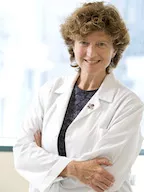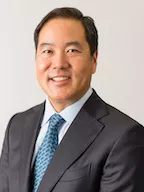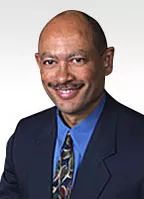Pancreatic Cancer Update
Multidisciplinary Care for Pancreatic Cancer
Pancreatic cancer is the fourth-leading cause of cancer-related death in the United States. Recently identified premalignant cysts arising in the pancreas have raised many questions regarding the best methods to screen for cancer. To provide state-of-the-art individualized care for patients with this complex disease, UCSF assigns treatment to multidisciplinary teams comprised of surgeons, medical oncologists, gastroenterologists, pain specialists and dietitians, with care coordination by nurses.

"One thing we've learned is that pancreatic tumors are heterogeneous," said Professor of Surgery Kimberly Kirkwood, MD. "Using a combination of specialized tests, we try to determine the biological aggressiveness of the particular pancreatic tumor we are looking at, so that we can be much more effective in tailoring the treatment to suit the disease."
Using advanced diagnostic techniques such as multidetector CT scans, MRI and endoscopic ultrasound, gastrointestinal radiologists at UCSF are able to find pancreatic tumors at an earlier stage. These sophisticated studies provide a more accurate prediction of whether a tumor is benign, premalignant or malignant, and whether it can be safely and completely removed. Most benign tumors and up to 20 percent of invasive cancers are resectable.
Yet according to several recent studies, only about one-third of patients with potentially resectable pancreatic tumors undergo surgery. These studies also found that patients were less likely to receive surgery at low-volume and community centers. Pancreatic tumors are relatively rare, so most surgeons in the community have the opportunity to perform only one or two pancreas resections per year, and therefore may not have the breadth and depth of experience required to advise patients about evolving treatment options.
"At National Cancer Institute-designated hospitals like UCSF, patients have lower complication rates, lower mortality rates and shorter lengths of stay," said Kirkwood. For example, at UCSF, the perioperative mortality rate for patients 75 years and older who undergo the Whipple procedure (removal of the head of the pancreas, gallbladder and other affected organs) is 3 percent, compared with the statewide average of 10 percent. Interestingly, long-term survival following resection is also improved at high-volume, National Cancer Institute-designated hospitals such as UCSF.
Recent data show that five-year survival following resection of localized pancreatic cancer at UCSF is 41 percent, which compares quite favorably with 20 percent nationally, as reported in the SEER database for patients with a similar stage of disease.
Factors such as intensivists' presence in the ICU, systems of care, use of adjuvant therapy and better patient selection may all play a role in improved outcomes. Surgeons at the Pancreas Center offer a full range of options, from open procedures to laparoscopic surgery. Vascular surgeons can perform segmental vein replacement, using the latest tissue coagulation and sealing techniques to ensure that patients remain hemodynamically stable, and enabling resection of tumors that were previously inoperable.
"Given the complexity of pancreatic cancer surgery and the many alternative therapies that are available, trying to help patients, their families and their primary care physicians design an individualized treatment plan involves a model of complex decision making that I enjoy," said Kirkwood.
Patients are afforded "a coordinated, interdisciplinary approach to patients with complex disease. In addition to world-class surgeons, the Pancreas Center draws on the expertise of radiologists, gastroenterologists, medical and radiation oncologists, and other specialists to provide state-of-the-art care to patients", notes Nancy L. Ascher, MD, PhD, Professor of Transplant Surgery.
Surgeons partner with medical oncologists, who are designing protocols to use biomarker profiling of tumors from individual patients to offer "personalized" chemotherapy. In some cases, UCSF surgeons and community physicians can work together to administer a type of chemotherapy in the patient's own home.
In addition, patients have access to clinical trials for pancreatic cancer.
UCSF surgeons also work collaboratively with community physicians in developing customized treatment plans to help ensure seamless long-term care for patients. Specialized Expertise. UCSF also has experts in neuroendocrine tumors, slow-growing tumors that may produce hormones.

"These unregulated amounts of hormones not only cause the tumor to grow, but can cause terrible symptoms such as diarrhea, flushing and other problems," said Assistant Professor of Surgery Eric Nakakura, MD, PhD, a cancer surgeon who specializes in tumors of the pancreas, bile ducts, liver and gastrointestinal tract. For example, some types of neuroendocrine tumors can make an overabundance of insulin, resulting in dangerously low blood sugar that requires the patient to eat constantly to avoid passing out.
Nakakura and his medical oncology colleagues have identified a new genetic marker that will help diagnose patients with neuroendocrine tumors. They have also identified key signaling pathways that regulate tumor growth and hormone production. Together, they are also aggressively pursuing more effective treatments. "We want to diagnose people earlier, when treatment is more successful, as well as help patients with advanced disease live longer," said Nakakura. "We want to advance the standard of care."
This care can greatly improve quality of life for all patients with pancreatic cancer. For those unable to eat because their tumor is pushing against the stomach, surgeons can perform a minimally invasive bypass surgery that reroutes the path of food from the stomach to the intestine. Almost all pancreatic cancer patients are malnourished because their tumors produce cytokines that cause the breakdown of muscle mass. Dietitians help patients maximize their nutritional intake.
Pain specialists help them manage physical discomfort through a combination of narcotic and nonnarcotic medications, as well as Eastern medicine approaches, acupressure, massage and other treatments. Radiofrequency ablation or surgical removal of nerves that supply the pancreas can also relieve pain caused by tumors or chronic pancreatitis. In addition, the Pancreas Center provides advanced genetic screening for patients and family members who may have an elevated risk of developing cancer.

"The Division of General Surgery at UCSF has a long tradition of providing outstanding clinical care to patients suffering from diseases of the pancreas," said Hobart W. Harris, MD, MPH, J. Englebert Dunphy Endowed Chair in Surgery and Chief, Section of Gastrointestinal Surgery.This level of care represents a natural evolution of our commitment to patient-centered, innovative and compassionate care for patients with complex conditions."
